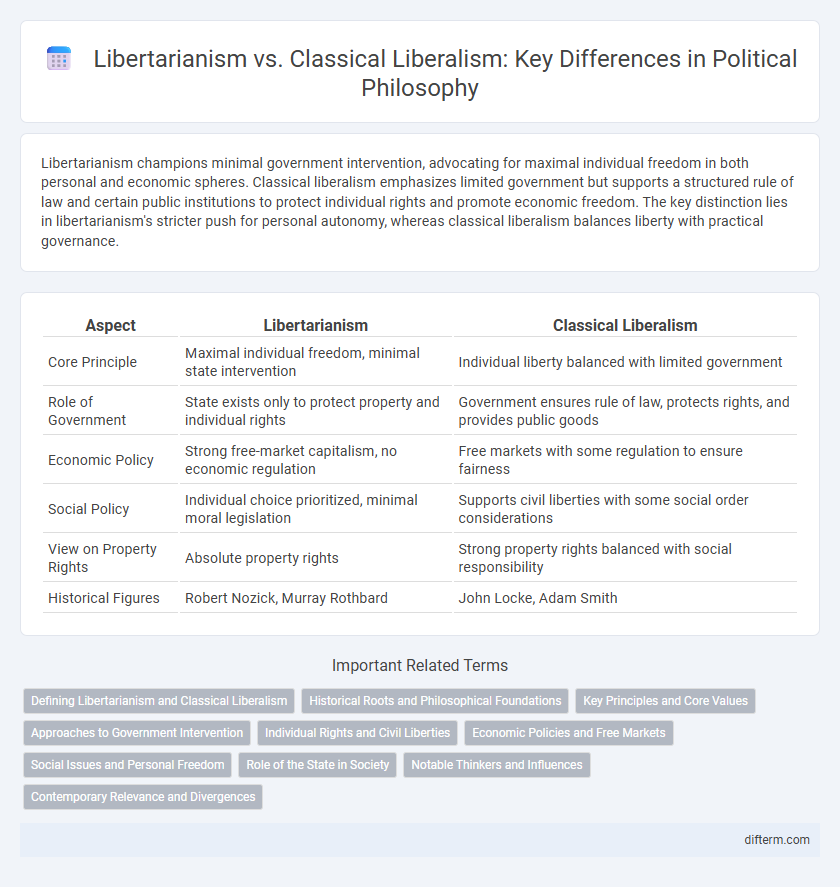Libertarianism champions minimal government intervention, advocating for maximal individual freedom in both personal and economic spheres. Classical liberalism emphasizes limited government but supports a structured rule of law and certain public institutions to protect individual rights and promote economic freedom. The key distinction lies in libertarianism's stricter push for personal autonomy, whereas classical liberalism balances liberty with practical governance.
Table of Comparison
| Aspect | Libertarianism | Classical Liberalism |
|---|---|---|
| Core Principle | Maximal individual freedom, minimal state intervention | Individual liberty balanced with limited government |
| Role of Government | State exists only to protect property and individual rights | Government ensures rule of law, protects rights, and provides public goods |
| Economic Policy | Strong free-market capitalism, no economic regulation | Free markets with some regulation to ensure fairness |
| Social Policy | Individual choice prioritized, minimal moral legislation | Supports civil liberties with some social order considerations |
| View on Property Rights | Absolute property rights | Strong property rights balanced with social responsibility |
| Historical Figures | Robert Nozick, Murray Rothbard | John Locke, Adam Smith |
Defining Libertarianism and Classical Liberalism
Libertarianism emphasizes maximal individual freedom, minimal government intervention, and strong property rights, advocating for personal autonomy in both economic and social spheres. Classical liberalism supports individual liberties as well but balances them with a limited government role to protect rights, maintain order, and promote free markets. Both ideologies value freedom and limited state power, yet libertarianism seeks a more radical reduction in government functions compared to the more moderate approach of classical liberalism.
Historical Roots and Philosophical Foundations
Libertarianism and classical liberalism share historical roots in Enlightenment-era thinkers such as John Locke, whose advocacy for individual rights and limited government shaped both ideologies. Classical liberalism emphasizes a balanced approach to liberty and government intervention, drawing on philosophers like Adam Smith and John Stuart Mill, who supported free markets alongside certain regulatory roles. Libertarianism, influenced by figures like Robert Nozick and Murray Rothbard, advances a more stringent commitment to personal freedom and minimal state authority, prioritizing non-intervention in both economic and personal spheres.
Key Principles and Core Values
Libertarianism emphasizes individual liberty, minimal government intervention, and free-market capitalism, prioritizing personal autonomy and private property rights above all. Classical liberalism centers on limited government, rule of law, and individual rights, striving for a balance between economic freedom and protecting civil liberties. Both philosophies value freedom and personal responsibility but differ in the extent of government's role in economic and social affairs.
Approaches to Government Intervention
Libertarianism advocates for minimal government intervention, emphasizing individual freedom and free-market principles with limited regulatory oversight. Classical liberalism supports a balanced role of government, endorsing interventions that protect individual rights, promote social welfare, and maintain public order. Both philosophies prioritize liberty but diverge on the extent and nature of government involvement in economic and social affairs.
Individual Rights and Civil Liberties
Libertarianism emphasizes minimal state intervention, advocating for absolute individual rights and maximal civil liberties, particularly in personal and economic spheres. Classical liberalism supports individual rights as essential to political freedom but accepts a limited government role in regulating economic activity to maintain social order and protect property. The core distinction lies in libertarianism's prioritization of personal autonomy above collective interests, whereas classical liberalism balances individual freedom with institutional frameworks.
Economic Policies and Free Markets
Libertarianism advocates for minimal government intervention in economic activities, emphasizing personal freedom and free markets as essential for innovation and prosperity. Classical liberalism supports free markets but endorses limited government regulation to correct market failures and ensure property rights. Both ideologies prioritize economic freedom, but libertarianism pushes for a more radical reduction of state involvement compared to the pragmatic approach of classical liberalism.
Social Issues and Personal Freedom
Libertarianism emphasizes maximal individual freedom, advocating minimal government intervention in social issues such as drug legalization, marriage equality, and free speech, prioritizing personal autonomy over collective norms. Classical liberalism supports personal freedom but accepts limited state role in regulating social matters to maintain public order and protect individual rights within a legal framework. The core divergence lies in libertarianism's absolute defense of personal liberty versus classical liberalism's balance between freedom and societal stability.
Role of the State in Society
Libertarianism advocates for minimal state intervention, emphasizing individual liberty and limited government primarily to protect property rights and personal freedoms. Classical liberalism supports a more balanced role for the state, endorsing government involvement in maintaining rule of law, enforcing contracts, and providing basic public services to facilitate a functioning free market. Both philosophies prioritize personal freedom but diverge on the extent of state responsibility in economic and social affairs.
Notable Thinkers and Influences
Notable thinkers of libertarianism include Robert Nozick and Murray Rothbard, who emphasize individual liberty, minimal state intervention, and free markets. Classical liberalism, influenced by John Locke, Adam Smith, and John Stuart Mill, advocates for limited government, rule of law, and economic freedom while supporting some state functions. Both ideologies share roots in Enlightenment philosophy but diverge on the extent of government involvement in society and the economy.
Contemporary Relevance and Divergences
Libertarianism emphasizes minimal state intervention and individual autonomy as essential for personal freedom, diverging from classical liberalism's acceptance of limited government roles in regulating markets and providing public goods. Contemporary relevance of libertarianism is evident in debates over privacy rights, drug legalization, and deregulation, contrasting with classical liberalism's support for balanced government involvement to safeguard social order and economic stability. Both ideologies converge on promoting civil liberties but differ in the scope and scale of government authority deemed appropriate in modern governance.
libertarianism vs classical liberalism Infographic

 difterm.com
difterm.com